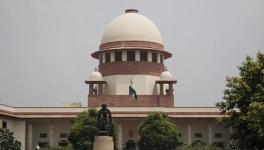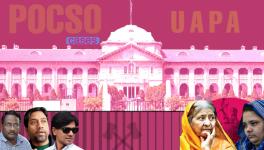Gauhati HC Sets Aside Ex Parte Order Declaring Person as Foreigner, Says Citizenship Important Right
The Gauhati High Court has reiterated its stand that citizenship matters should be decided upon merits instead of via ex parte orders. The bench of Justices N Kotiswar Singh and Manish Choudhury has set aside an ex parte order against a petitioner who raised the plea that since he is poor and was required to leave Assam in search of livelihood, he was unable to appear before the Foreigners' Tribunal (FT).
The petition was filed for setting aside the ex parte order passed by the Morigaon FT on April 26, 2011 (in Case No.F.T.(D) 100/2009) by which the petitioner was declared foreigner under Section 2(a) of the Foreigners Act, 1946, because of his failure to submit written statement by adducing evidence to prove his documents.
The petitioner, Asor Uddin, resident of Sahariapam, Moirabari, raised a plea that he was unable to appear before the the Tribunal because he is poor, and he could not readily collect the relevant documents bearing the names of his grandfather, father and also could not file the written statement. He stated that he could not communicate with the engaged counsel nor his counsel communicated with him of the subsequent dates fixed by the Tribunal. He also submitted that he had to leave for Kerala to earn a livelihood. Yet, he had appeared before the FT on February 12, 2010 through his engaged lawyer, as he had no intention to evade the proceedings and several dates were given for filing of a written statement on certain facts. But the petitioner failed to do the same for the aforementioned reasons, and thus this ex parte order was passed against him declaring him a foreigner.
He contended that he was categorised as D-voter (Doubtful Voter) by the verification officer without proper examination of his documents.
The counsel for the Tribunal, Ms. A Verma argued that such petition cannot be entertained as the petitioner himself is to be blamed for non-appearance, and the law is clear on the same and that the Tribunal had no option but to proceed ex-parte and declare him as a foreigner as required under law.
The court, at the outset stated that “we are of the view that citizenship, being an important right of a person, ordinarily, should be decided on the basis of merit by considering the material evidences that may be adduced by the person concerned and not by way of default as happened in the present case.”
The petitioner also presented facts before the court including voters' lists of 1965, 1970 and 1971, wherein the names of his grandparents, parents and the petitioner himself have been shown to be included. However, the court said that these aspects are to be ordinarily considered by the Foreigners' Tribunal and thus remanded the matter to Morigaon FT (2nd) for reconsideration. “If the petitioner is able to prove the aforesaid documents, certainly, he can make a reasonable claim that he is an Indian citizen and not a foreigner, for which we feel that it will be most appropriate to remand the matter to the Foreigners' Tribunal (2nd), Morigaon, Assam for reconsideration,” the court said.
The court deemed after perusing the petitioner’s submissions that there were sufficient reasons for the petitioner for not being able to appear before the Foreigners' Tribunal and hence, the court was inclined to “afford another opportunity to the petitioner to appear before the Foreigners' Tribunal to prove that he is an Indian, not a foreigner.”
The court thus allowed the petition and set aside the impugned ex parte order in Case No.F.T.(D) 100/2009. The court also directed the petitioner to appear before the Tribunal on or before November 8 for fresh proceedings. The court stated that since the petitioner’s citizenship is under consideration he is deemed to be out on bail and directed him to appear before the Superintendent of Police (B), Morigaon within 15 days and on furnishing a bail bond of Rs. 5,000 with one local surety of the like amount. The court also imposed travel restrictions on the petitioner and denied him the liberty to leave the jurisdiction of the Morigaon district without obtaining permission from the Superintendent of Police (B), Morigaon.
The court also imposed a cost of Rs. 5,000 on the petitioner to be deposited at the Tribunal and stated that in event of failure to make the payment and to appear before the Tribunal on the stipulated date, the ex-parte order will stand revived, and will take its course.
The complete order may be read here:
The Ex parte menace
The Foreigners Tribunals in Assam have passed ex-parte orders on several occasions. SabrangIndia’s sister organisation, Citizens for Justice and Peace (CJP) has helped secure release of many persons who were thrown into detention camps after an ex parte order was passed against them declaring them foreigners. In July the court set aside ex parte order against one Sefali Rani Das who did not get proper legal advice from her counsel and in April as well similar order was passed in favour of one Rahima Khatun who raised the plea that her son was appearing on her behalf without her knowledge.
In April, CJP's Assam team secured bail of Chenbhanu Begum, a daily wage labourer after she was declared foreigner in an ex-parte order. In early June, the team managed to secure release of a Dalit woman, Shanti Basfore, who was detained in Kokrajhar detention camp after being declared foreigner in a ex parte order. Notably, a 101-year old man was detained after he was declared foreigner in an ex parte order and he spent three months in a detention camp before he was finally released. Chandrahar Das, a registered refugee from Bangladesh, was declared ‘foreigner’ as the Dementia and Parkinson’s Disease afflicted man, arrested at the age of 101, could not recall when he crossed into the country. He died at the age of 104 years, still asserting his Indianness but he died a ‘declared foreigner’.
All these petitions that come before the High Court have a human side to them and a different story of hardship to narrate. It is these human stories that make us realise the human cost of the exercise in Assam and how these people struggle to come before courts bearing legal costs, to prove that they are Indians.
Courtesy: Sabrang India
Get the latest reports & analysis with people's perspective on Protests, movements & deep analytical videos, discussions of the current affairs in your Telegram app. Subscribe to NewsClick's Telegram channel & get Real-Time updates on stories, as they get published on our website.
























